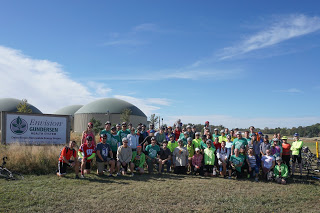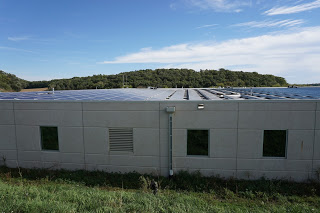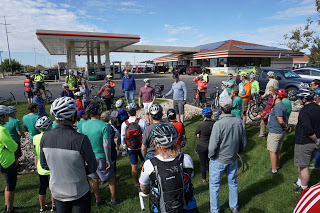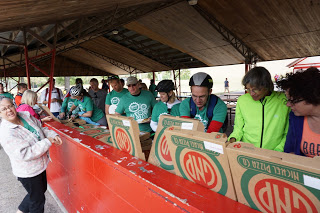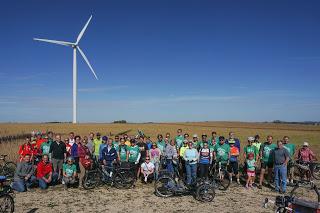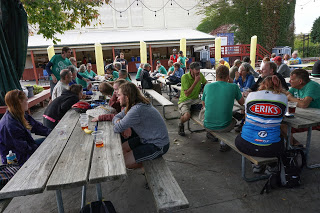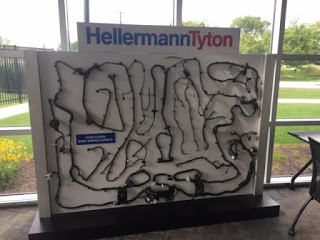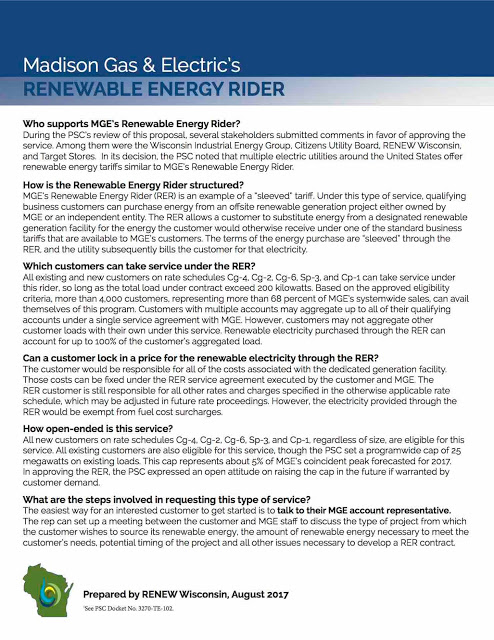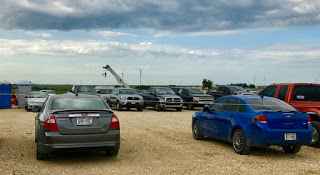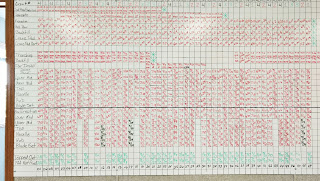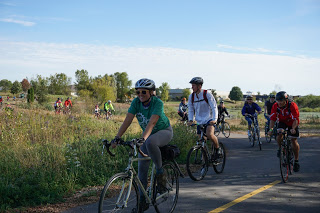
by jboullion | Oct 9, 2017 | Uncategorized
On Sunday, October 1st, RENEW Wisconsin, with presenting sponsor SunPeak, hosted its 5th annual “Ride with RENEW” bicycle tour of renewable energy projects, with this year’s ride taking place in Middleton, WI. All event proceeds supported RENEW Wisconsin’s ongoing work to advance renewable energy in Wisconsin.
Check out all the photos on our Facebook photo album!
Our biggest bike event yet, we had seventy-four riders who traveled approximately 25 miles on paved roads and bike paths to visit innovative wind, solar and biogas energy generation facilities in scenic northwest Dane County. Seven seasoned cyclists opted for the extended route of about 40 miles to travel at their own pace.
As a fundraising event, we are proud to announce that we raised over $20,000 from 203 donations (so far)! This amount will be matched with $15,000 from John & Mary Frantz and another $5,000 from a private donor.
Participants got an inside look at some of the area’s leading renewable energy projects and enjoyed breakfast, lunch (pizza donated by Glass Nickel Pizza), and beverages (post ride beer donated by Capital Brewery) along the way. They visited with installers and workers who are advancing renewable energy every day, and heard from customers about why clean energy works for their pocketbooks and their businesses.
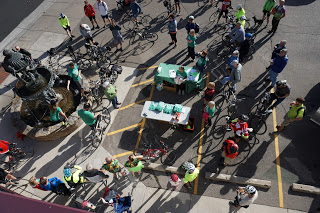 Riders gathered at Sustainable Engineering Group’s net-zero solar powered office in downtown Middleton. They checked in and enjoyed an open house hosted by Sustainable Engineering Group staff.
Riders gathered at Sustainable Engineering Group’s net-zero solar powered office in downtown Middleton. They checked in and enjoyed an open house hosted by Sustainable Engineering Group staff.
The first stop of the ride was Gundersen Health Systems & Dane County Biodigester. This project converts manure to make enough electricity to power approximately 2,500 homes while keeping manure out of the watershed.
Next, we visited Madison Gas & Electric’s Middleton Shared Solar project, a large 500 kilowatt solar project on the roof of the Middleton Operations Center. Subscribers to this pilot shared solar program receive the benefits of locally generated solar power from a centralized solar project.
Presenting sponsor, SunPeak, led a discussion on one of their projects, the PDQ in downtown Middleton. The solar panels installed on this store showcase the market advances of solar alongside traditional fuels.
Riders enjoyed a pizza lunch donated by Glass Nickel Pizza.
After lunch, we rode north to Epic’s “Galactic” Wind Farm, featuring six turbines along the rolling hills northwest of Madison which generate enough electricity.
The ride concluded with refreshments at Capital Brewery, also powered by a set of solar panels.
Sponsors of the Event included SunPeak (presenting sponsor), Sustainable Engineering Group, Capital Brewery, City of Middleton, H&H Solar, UW Madison Engineering Professional Development, Summit Credit Union, Wegner CPAs, Full Spectrum Solar, One Energy Renewables, Glass Nickel Pizza, Midwest Solar Power, Madison Solar Consulting, Keyes & Fox, Sustainable Technologies, Open Circle UUF, and Willy Street Co-op.
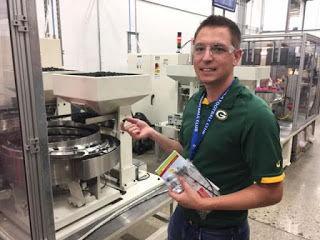
by jboullion | Sep 29, 2017 | Uncategorized
by Tyler Huebner
Last month, Nick Korth, the Product Marketing Manager for Energy at HellermannTyton, invited me to visit their Milwaukee factory.
This is an impressive operation. HellermannTyton manufactures and distributes a number of parts that make solar installations possible, all across America.
 |
Nick Korth of HellermanTyton shows off a very small clip, for which
thousands would be used for a single utility-scale solar project. In his
hand is a sample kit of zip ties, plastic parts, and safety labels used to
comply with electrical codes for solar projects of all sizes. |
From zip ties for wire management to small clips that are used in each panel, HellermannTyton makes millions of these small parts which go in everything from rooftop solar for homes to utility scale projects.
The company is also a leader in ensuring compliance with electrical codes. From wire management to labeling, the company helps solar installers ensure their projects are installed correctly and safely.
HellermannTyton makes this equipment right in Wisconsin, but sells it to solar projects all over the country. They have a number of assembly lines with huge presses for making both plastic and metal parts.
In addition, the company makes wire management systems for automobiles. Nick explained how the system below is for a modern gasoline-powered vehicle. He said the same types of wire harnesses for electric cars are at about twice as long and twice as thick.
HellermannTyton is one example of many Wisconsin-based companies building the parts necessary to enable a clean energy transition, both for solar power and electric vehicles. Thank you, Nick, for the tour and education, and we look forward to seeing your products in more and more Wisconsin-based projects in the years to come!
by jboullion | Sep 20, 2017 | Uncategorized
Wednesday September 20, 2017,
Madison.
For
Immediate Release
For More Information
Katherine
Klausing, RENEW Wisconsin
608-255-4044
x5, 614-406-1105
 Solar for Good, a new initiative from the renewable
Solar for Good, a new initiative from the renewable
energy advocates at RENEW Wisconsin,
will offer grant funding to assist mission-based Wisconsin nonprofit
organizations with installing solar panels on their facilities.
The grant program was created and funded entirely by a donation from local
philanthropists Cal and Laurie Couillard
of Deerfield.
With solar
installation costs falling dramatically and public enthusiasm on the rise, more
and more people and businesses have installed solar in recent years, and the
program seeks to expand the benefits of solar to not-for-profit organizations.
“We know
that the solar energy boom is having a positive impact on our Wisconsin communities,
from creating good local jobs to cleaning our air and water,” said Tyler Huebner, Executive Director of RENEW
Wisconsin. “That’s why we are very excited to help more nonprofit
organizations and houses of worship, who are working every day to improve our
communities, join the solar movement.”
Solar for Good will award
a total of $125,000 in grants to nonprofit organizations and houses of worship to
assist them in installing solar electricity systems. The grant program will
fund up to 20% of the cost of a solar project, with a grant cap of $10,000 for
solar projects sized less than 75 kW and a grant cap of $20,000 for projects 75
kW and above. Solar for Good will also offer small grants for technical
assistance, including professional solar site assessments and engineering
services, to get projects started and see them through to success.
By installing their own solar projects, these
organizations will be able to generate their own clean, renewable energy, save
money on their utility bills, and reinvest the energy cost savings back into
their missions.
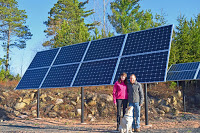 RENEW Wisconsin and Solar for Good aim to use the grants to help
RENEW Wisconsin and Solar for Good aim to use the grants to help
organizations going solar to spread the word about their solar investments and
educate their communities about the benefits of solar energy.
“The cost of installing solar panels has fallen by over half
in the past five years. With these lower
costs, we have an opportunity to make sure that all segments of our community can
receive the many benefits of solar energy, including a lower electricity bill
and an energy source we can feel good about,” said Katherine Klausing, Engagement Manager at RENEW Wisconsin. “As leaders and messengers, these
organizations can demonstrate how solar energy really benefits everyone, not
just the traditional ‘early-adopters’.”
The fund was started by a single family, “but their dream is that we
would grow this initiative beyond a single round of funding,” added Huebner.
“If there are other philanthropists out there who care about renewable energy
and want to invest in local community organizations, we encourage them to reach
out to RENEW Wisconsin and consider supporting this new initiative.”
The program will run in concert with Focus on Energy rebates which are also
available for many nonprofit organizations in Wisconsin. Beyond those rebates, homeowners and
businesses can take advantage of tax credits which enable them to lower the
costs of solar investment. This program is focused on mission-driven non-profits
who would not benefit from those tax credits.
How to Apply
In order to
be eligible, the organization must be a registered nonprofit organization
located in Wisconsin, be in good financial standing, be ready to install solar
and agree to participate in educating community members about the benefits of
solar energy. If approved for a grant, all fundraising, design and installation
for the solar project must be completed within 12 months. The program is geared
towards mission-based, primarily 501(c)3 organizations, and is not designed for
local governments or schools.
Applications
for this round of funding must be received by Monday November 13th 2017. Decisions and funding announcements
will be made by Monday December 11th, 2017.
For organizations
looking at solar for the first time, technical assistance grants are available
to fund a solar site assessment (up to $250) or engineering review (up to $500)
for their solar array. These applications will be reviewed separately from the
applications for grants for solar installation and will be awarded on a
first-come, first-served basis.
About RENEW Wisconsin
RENEW Wisconsin is a
nonprofit organization which promotes renewable energy in Wisconsin. We work on
policies and programs that support solar power, wind power, biogas, local
hydropower, and geothermal energy. More information is available on RENEW’s
website: www.renewwisconsin.org
#####

by jboullion | Sep 15, 2017 | Uncategorized
September 15, 2017
Contact Tyler Huebner, Executive Director
608.255.4044 ext. 1

Today the Public Service Commission of Wisconsin announced the results of the Request for Proposals (RFP) that was issued earlier this year to support an Integrated Anaerobic Digester project. The goal of the RFP was to identify one or more projects that would support renewable energy generation, improved manure management for dairy farms, and improved water quality.
Three proposals were submitted, and one proposal was unanimously recommended by the review committee. The PSC agreed with the recommendation, and allocated $15 million of the state’s Focus on Energy program funding to support this project. The project’s total estimated cost is $60 million.
The project is called “Green Pastures Bio Energy Center” and was proposed by BC Organics, LLC. The PSC’s news release identified the consortium as including 24 members and led by Dynamic Concepts of Waukesha, WEC Energy Group of Milwaukee, US Biogas of Plymouth, and BioStar Organics. The project would be located in Brown County and involve 9 dairy operations with a combined 22,882 animal units.
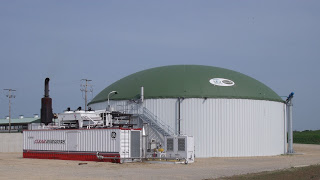
Wisconsin is the national leader in on-farm biodigesters. This new project will involve accepting manure and potentially other organic waste products (such as food waste) into multiple anaerobic digesters located near a proposed landfill in Brown County. The digested material will produce renewable natural gas, which would be injected into a large natural gas pipeline to bring it to customers. Enough renewable gas would be produced to provide the home heating needs of 7,600 Wisconsin homes.
RENEW Wisconsin’s Executive Director, Tyler Huebner, issued the following statement about this decision:
Biogas is a Wisconsin-based renewable energy resource that keeps dollars in our state. We are very happy to see the State’s investment into local renewable energy, and we hope this project proceeds and is very successful in creating value from what are waste products today. As a leader in anaerobic digesters, we hope Wisconsin policymakers and our utilities will use this investment as a springboard to increase their support for all digesters, including the 34 on-farm digesters already in operation today. There are a lot of farms in Wisconsin that need manure management solutions, and we believe biodigesters are one solution that can meet those needs while also bolstering Wisconsin’s reputation as an innovator and leader in energy.
It is important to keep in mind that no one project is going to solve the very challenging agricultural and water-quality issues for northeast Wisconsin. We believe today’s PSC decision is an important step in the right direction.
Wisconsin is known for our dairy cows and we hope one day soon we will also be known for our leadership on waste-to-renewable energy innovation.
The PSC had previously allocated up to $20 million for this project for the Request for Proposals stage. With $15 million allocated for this project, the Commissioners unanimously agreed to keep the $5 million not yet spent in a dedicated fund for biodigesters and renewable energy going forward.
The Public Service Commission’s press release can be found here.
A memo from the Public Service Commission describing the proposals and the evaluation process is available here.
-END-
RENEW Wisconsin is a nonprofit organization which promotes renewable energy in Wisconsin. We work on policies and programs that support solar power, wind power, biogas, local hydropower, and geothermal energy. More information on RENEW’s website: www.renewwisconsin.orgwww.renewwisconsin.org.
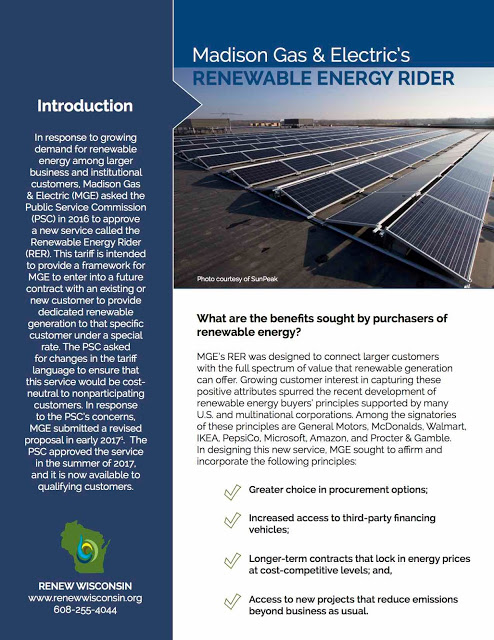
by jboullion | Aug 30, 2017 | PSC Priorities, Uncategorized
Madison Gas & Electric is now offering a first-in-Wisconsin opportunity for its business and institutional customers to access clean, renewable energy.
Called the “Renewable Energy Rider,” the program allows Madison Gas & Electric (MGE), a local investor-owned utility, to enter specific contracts with existing or new customers in which MGE will provide a dedicated renewable energy project to that customer.
This program follows a dramatic uptick in corporate and local government interest in renewable energy across America. It enables these customers (more than 4,000 MGE customers in total are eligible) to directly pay for the sourcing of solar, wind, bioenergy, or other renewable energy on their electric bill, and to source that energy from additional and new projects if the customer desires.
RENEW Wisconsin has developed a two-page fact sheet for interested customers and stakeholders, as shown below and
available for download:
RENEW Wisconsin is available to help any MGE customer business or non-residential customer take advantage of the program, and we are also encouraging other Wisconsin utilities to follow the lead and offer a similar program for their customers to directly access clean, renewable energy!
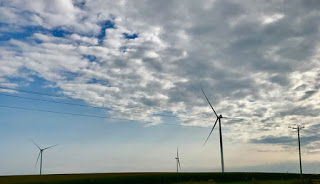
by jboullion | Aug 25, 2017 | Uncategorized, Utility Scale
The RENEW Wisconsin team got an up-close view of the Wisconsin Quilt Block Wind Farm on August 24th. The wind farm, developed by RENEW business member EDP Renewables, is located 50 miles southwest of Madison in Lafayette County’s Seymour Township. The turbines compliment the area’s sprawling corn, wheat, and soybean fields and provide local farmers with a stable cash crop in the form of landowner lease payments.
We drove about an hour and fifteen minutes from Madison through the beautiful rolling hills of southwest Wisconsin. About 10 minutes from our destination, we caught our first glimpse of the striking wind turbines in the distance.
When we pulled into the lot where the project offices were located, we were all struck by the impressive number of vehicles and people going about their work, a testament to the 100 full time jobs created during construction. The wind farm will also offer 12 permanent jobs during the life of the project.
We entered the on-site offices and were greeted by a very friendly project team and other invited guests, including U.S. Representative Mark Pocan, whose congressional district includes the new wind farm. We also heard from local leaders who were proud to show us the project and share their great experiences working with the EDP team and others. The project is intricately tracked on a white board in the job site trailer, with each turbine listed along with process steps and status. We learned that 41 of the planned 49 turbines had already been erected or “topped out,” putting the project ahead of schedule.
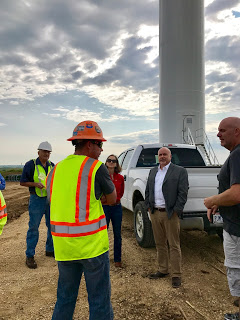
After enjoying coffee and donuts, we piled into several pickup trucks for the short drive to one of the turbines that had recently been erected. Our guide Chris, an inspector and surveyor who oversees the construction of the concrete bases for EDP, gave us a quick safety talk, then gamely answered all of our questions about the construction process. One big surprise? The ‘top-out’ process, where workers use cranes to hoist a nacelle and blades atop each tower, is completed for each of the 49 turbines by a single work crew of only a dozen people. We were impressed by the efficiency.
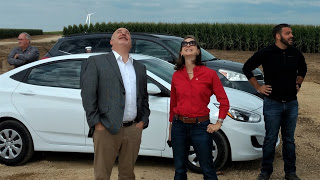
On site, we stood directly beneath a recently-constructed wind turbine, towering above us. As lovely as it was to see the turbines in the distance, this was even more majestic. We were overwhelmed by the size and beauty of the turbines. Tim McComish, the Chairman of the Town of Seymour and a 5th generation local farmer said he did a lot of research when the wind farm was first proposed. He was concerned that the turbines would ruin the landscape. “I love how they look,” he said.
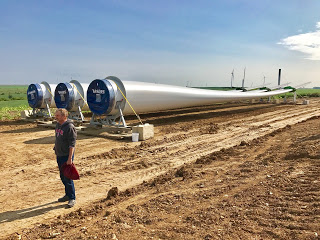
At our next stop, we stood beside a tower with its nacelle and 3 blades on the ground, waiting to be hoisted by two large cranes later in the day. Standing next to three enormous turbine blades, the size and perspective was mind-blowing. The blades and nacelles on these impressive structures can actually be raised and assembled in 3 to 4 hours, if the wind conditions and weather allow.
RENEW toured the project along with a number of local officials including Tim Burgess, a Supervisor in Seymour. He is supportive of the wind farm and enthusiastic about the benefits it will bring to the local community. “Any farmer or community who tries to keep a project like this out of their area is crazy,” he joked. Burgess is also one of the 44 local land owners who are leasing land to the farm. He was impressed by how efficient, professional, and considerate all of the contractors on the project had been.
When finished, the 98 MW wind farm will produce enough clean electricity to power more than 37,000 Wisconsin homes. The energy will be purchased from Quilt Block by Dairyland Power Cooperative.
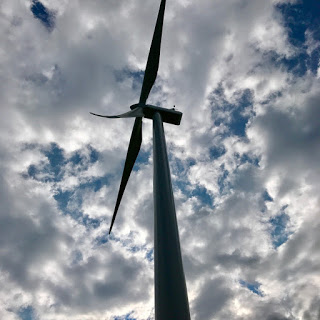
This wind farm represents a capital investment of approximately $167 million. About $400,000 in revenue every year will be generated for local governments, divided among the county and towns. For the Township of Seymour, where the wind farm is located, the $150,000 they will earn each year is bigger than their current annual budget, and they are eager to put the revenue toward new projects and improvements to local roads, according to Vanessa Tutos of EDP Renewables.
Why Quilt Block? We learned that the wind farm’s name references the barn quilts of Lafayette County. Barn quilts are painted wood or metal quilt blocks mounted on barns or other buildings and celebrate the area’s agricultural heritage.
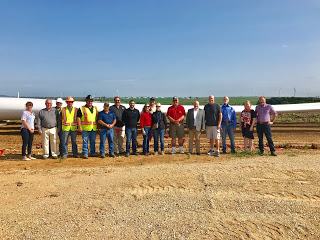
We’re grateful to Vanessa, Wayne, and everyone at EDP Renewables and the residents of Lafayette County for their hospitality. We’re also glad we had the chance to talk with U.S Representative and renewable energy proponent Mark Pocan. It was a privilege to see first-hand the beauty and benefits of this amazing wind farm and to meet the team that made it possible.
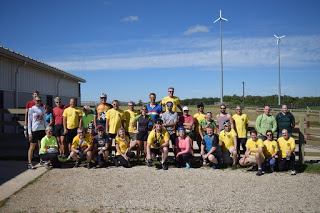
by jboullion | Aug 23, 2017 | Uncategorized
“Ride with RENEW” will highlight area renewable energy projects
Madison, WI – August 23, 2017; Contact Tyler Huebner, Executive Director, 608-255-4044 ext 1.
On Sunday, October 1st, RENEW Wisconsin, with presenting sponsor SunPeak, will host its 5th annual “Ride with RENEW” bicycle tour of renewable energy projects, with this year’s ride taking place in Middleton, WI. All event proceeds support RENEW Wisconsin’s ongoing work to advance renewable energy in Wisconsin.
Riders will travel approximately 22 miles on paved roads and bike paths to visit innovative wind, solar and biogas energy generation facilities in scenic northwest Dane County.
 |
| 2015 Ride with RENEW – Lake Geneva |
The total tour time will be approximately 6 hours (including stops at renewable energy sites) and actual riding time will be 2 to 3 hours. Seasoned cyclists will have an optional longer route of about 40 miles to travel at their own pace.
Participants will get an inside look at some of the area’s leading renewable energy projects and will enjoy breakfast, lunch, and beverages along the way. They will visit with installers and workers who are advancing renewable energy every day, and hear from customers about why clean energy works for their pocketbooks and their businesses.
The stops and start and end schedule is as follows:
∞ Gather at BMO Harris Bank parking Lot in Middleton for a 9:30 a.m. departure.
∞ Sustainable Engineering Group’s net-zero solar powered office in downtown Middleton.
∞ Gundersen Health Systems & Dane County Biodigester. This project converts manure to make enough electricity to power approximately 2,500 homes while keeping manure out of the watershed.
∞ Madison Gas & Electric’s Middleton Shared Solar project, a large 500 kilowatt solar project on the roof of the Middleton Operations Center. Subscribers to this pilot shared solar program receive the benefits of locally generated solar power from a centralized solar project.
∞ Epic’s “Galactic” Wind Farm, featuring six turbines — each with three 135-foot blades – which rise hundreds of feet above the rolling hills northwest of Madison and generate enough electricity to help Epic offset much of its energy needs.
∞ PDQ in downtown Middleton. Presenting sponsor SunPeak installed solar panels on this store which showcases the market advances of solar alongside traditional fuels.
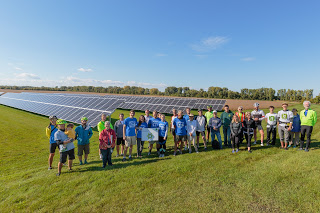 |
2016 Ride with RENEW – Sisters of St. Agnes Solar Array in
Fond du Lac |
The ride will conclude at Capital Brewery, also powered by a set of solar panels, for refreshments around 4:00 p.m.
Registration for the ride is open through September 29th. The cost is $30 for members of RENEW Wisconsin, $40 for non-members, and $60 to both register for the ride and become a member of the organization for one year. All donations to RENEW Wisconsin for this charity bike ride are matched up to $15,000 by generous donors John & Mary Frantz of Madison!
Individuals and businesses can donate to RENEW Wisconsin or in support of a rider, sign on as an event sponsor, or volunteer on ride day.
“We are very excited to tour some of the Middleton area’s great renewable energy projects on Sunday, October 1st,” said Tyler Huebner, Executive Director of RENEW Wisconsin. “This tour allows us to showcase a variety of ways to produce homegrown, clean energy right here in Wisconsin including wind, solar, and even cow manure. This is a really fun event where you can meet great people, help a good cause, and learn together about clean energy in Wisconsin.”
Sponsors of the Event include SunPeak (presenting sponsor), Capital Brewery, City of Middleton, H&H Solar, Summit Credit Union, Wegner CPAs, Full Spectrum Solar, One Energy Renewables, Midwest Solar Power, Madison Solar Consulting, Open Circle UUF, and Willy Street Co-op. There is still time to sponsor if your business or organization wishes to do so.
About RENEW Wisconsin
RENEW Wisconsin is a nonprofit organization which promotes renewable energy in Wisconsin. We work on policies and programs that support solar power, wind power, biogas, local hydropower, and geothermal energy. More information on RENEW’s website: www.renewwisconsin.org.

by jboullion | Aug 8, 2017 | Uncategorized
Last week WPPI Energy announced it will purchase the output
from a large 132 megawatt wind project in Illinois. With this planned addition of a new source of
wind energy to its generation portfolio, WPPI Energy will strengthen its
position as a low-cost provider of clean energy to its 51 member municipal
utilities, 41 of which are located in Wisconsin.
Along with its
previously
announced solar addition in Manitowoc County, WPPI Energy will be
providing over 20% renewable energy to its customers when these projects are
completed.
RENEW Wisconsin’s Executive Director Tyler Huebner released
the following statement:

“We commend WPPI Energy for partnering with Invenergy to
expand its supplies of clean, affordable wind energy.
Wind energy is the lowest-cost way to produce
wholesale power here in the Midwest.
We
encourage other Wisconsin electricity providers to follow WPPI Energy’s example
of adding wind and solar to their generation mix.”
Situated in Henry County southeast of Rock Island, Illinois, the new wind project
will supply WPPI Energy with about 450 million kilowatt-hours of electricity a
year when it is placed in service next year. The 66-turbine, 132-megawatt
project will be owned by Invenergy, a Chicago-based wind developer, which also
owns the 86-turbine, 129-megawatt Forward Energy Center south of Fond du Lac.
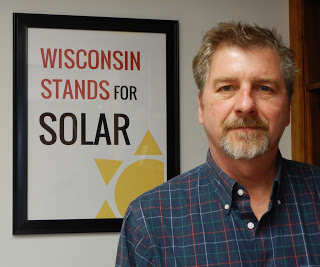
by jboullion | Aug 1, 2017 | Uncategorized
Michael Vickerman, RENEW Wisconsin • July 31, 2017
The writer Jonathan Swift wrote in 1710: “Falsehood flies, and the Truth comes limping after it.” Considering how far and fast misinformation can travel in this era of digital mass communication, Swift’s observation has grown even more prescient.
Earlier this month, a New York Times article declared that prospects for the U.S. rooftop solar market were dimming rapidly, a result of a utility-led campaign to roll back solar incentives at the state level. According to the article, the “explosive” growth experienced by the solar market in the last two years “has come to a shuddering stop,” going from an increase of 900 percent to a decline of 2 percent.
A few days later, a Chicago Sun-Times editorial cited these same statistics to paint its own grim portrait of a market seizing up due to the utilities’ pressure campaign.
With numbers like these, this characterization can’t help but conjure up images of installations interrupted in mid-construction, with stacks of panels and racking teetering in abandoned job sites ringed by forlorn chain-link fences. But there’s a serious problem with this picture, which is that it is utterly imaginary, without any grounding in the solar marketplace observable today.
In assessing the vitality of the solar energy marketplace, the reporter compared annual rates of growth from one year to the next. The problem with using that particular yardstick is that rates of growth will inevitably level off as the market matures and approaches saturation. Had the New York Times reporter simply compared numbers of systems installed or numbers of megawatts added from one year to the next, he would have arrived at a far truer picture of the situation.
According to reports prepared by GTM Research and Solar Energy Industries Association, 2016 was indeed a record-breaking year for solar energy, in which the capacity added nearly doubled 2015’s results. And though capacity additions this year will fall short of last year’s totals, it will surpass 2015’s additions by about 75 percent.
Yes, there will be a modest slowdown in 2017 relative to the year before. But in what universe can that trend line be characterized as a “shuddering stop”?
It’s worth noting that the GTM Research expects solar generating capacity to triple in the next five years, a milestone that can be accomplished with only a 25 percent annual growth rate.
In addition to the mishandling of the statistical measures, there are serious flaws with the article’s narrative. One of them is the assumption that the rooftop solar market is just for residences. But that view ignores the increasing popularity of larger solar systems on commercial and institutional rooftops.
Recent installations in Wisconsin, my home state, include a clinic in Onalaska (314 kW), a high school in Minocqua (280 kW), a convent in Fond du Lac (246 kW), a cold storage warehouse in Plymouth (560 kW), and two Target stores in the Madison area (540 kW combined).
And what are the factors driving solar energy’s growing with this market segment? Four causes stand out: (1) a sustained decline in the installed cost of solar energy; (2) rapid expansion of financing options and structures; (3) the extension of the investment tax credit for solar energy at 30 percent through 2019; and (4) greater sophistication in sizing PV systems and regulating their output relative to the customer’s load.
The articles also convey the implication that utilities are prevailing in their war against rooftop solar. While they have won a few battles here and there, including Indiana, they have lost in most other jurisdictions, and, in some cases, badly.
Nowhere has this war been waged with greater intensity than in Nevada. After state regulators issued an order in 2015 that devalued customer solar generation and sent the solar industry there fleeing to other states, state lawmakers sought to correct this injustice. This June, the legislature passed and the governor signed a law that restores fair credit to solar-generated electricity exported to the grid.
Indeed, if there is one state where the “reversal of fortune” meme is particularly apt, it is Nevada, though history will affirm that it was the antisolar camp that suffered this fate, not the solar industry.
Shifting eastward, a bid by New Hampshire utilities to have net metering scuttled boomeranged into a net loss for them. While Granite State regulators did approve temporary rates that will reduce incrementally the export value of solar-generated electricity, they also lifted the cap on net metering that would have otherwise triggered a slowdown in the marketplace. In the short run at least, this compromise will create stable market conditions and lead to an acceleration of solar installation activity there.
As noted in a recent guest column in Utility Dive, in states like Nevada and New Hampshire, the truth did finally catch up to the false narrative spun by utility lobbyists and their enablers. The result will be an expansion, not a contraction, of on-site solar generation, driven by fair pricing and customer demand. These outcomes can happen in other states as well, including my own, but it would certainly help if reporters would recognize and incorporate these important policy victories when they chronicle the trials and tribulations of the solar energy marketplace.
Michael Vickerman is program and policy director of RENEW Wisconsin, a renewable energy advocacy organization.
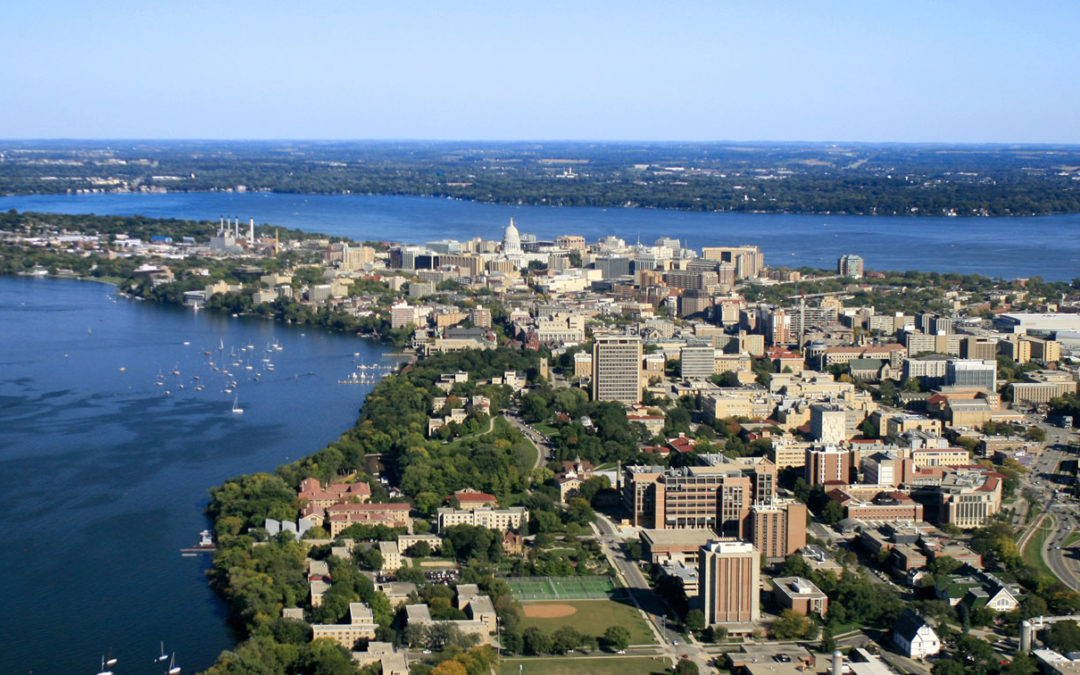
by Guest Blog | Jul 26, 2017 | Local Government, Local Initiatives, Uncategorized
On March 21, 2017 Madison’s city council signed a resolution committing the city to power 100 percent of its operations with clean energy.
The resolution was especially notable since the utility serving Madison gets almost half of its power from coal, and several years ago was among Wisconsin utilities making national headlines for policies seen as hostile to distributed solar energy.
But now the utility, Madison Gas & Electric (MGE), city officials and clean energy leaders are negotiating a Memorandum of Understanding that lays out plans for the expansion of solar, the spread of electric vehicles and other clean energy improvements. And the utility has pledged its support for the city’s clean energy goal.
Advocates describe the MOU and the city’s recent choice of consultants to develop clean energy plans as important progress.
Michael Vickerman is the program and policy director of RENEW Wisconsin and a member of the city’s Sustainable Madison Committee. Speaking in his role as a committee member, he called the MOU historic.
“It will enable the utility and one of its customers to jointly plan clean energy projects,” he said. “This generally doesn’t happen with utilities. You may think of the city as this governmental powerhouse, but in the eyes of the utility it’s just another customer. In order to commit city resources and staff time to joint endeavors and also for the utility to commit its own personnel and resources, both the city and MGE believe the scope of work should be spelled out in some kind of agreement.”
But some controversy over the MOU also shows how challenging it can be to bring together multiple parties with different responsibilities and interests in pursuit of a target as ambitious as 100 percent clean energy.
In 2016 the city adopted an energy work plan that included a promise to sign an agreement with MGE regarding collaboration on topics including electric vehicles, solar and grid modernization.
In June a resolution was introduced to the council that would give the city attorney and Mayor Paul Soglin authority to execute the MOU. The group Repower Madisonand several council members were concerned that this measure meant the council and the public would not actually have formal say over the contents of the MOU. And, they were unhappy that a May draft of the MOU did not mention the city’s 100 percent clean energy goal or anything about coal-fired power.
Council member David Ahrens said the proposed MOU was not given to council members to review when the resolution about it was first introduced, “creating a level of suspicion and unease about the process.” When the early draft of the proposed MOU “inadvertently” was made public, as Ahrens described it, he was disappointed that the 100 percent clean energy goal was not mentioned.
An improved draft
An amended draft MOU dated July 11 does note the city’s goal of 100 percent clean energy.
MGE spokesperson Dana Brueck said, “MGE supported the resolution for 100 percent clean energy at every stage as well as the Energy Work Plan. We believe we can accomplish more [toward the clean energy goal] by working collaboratively.”
A supporting document with the MOU proposes ways the utility and city could collaborate, including on a shared solar project, increased outdoor solar lighting, electrified public transit, electric vehicle group buys and boosting participation in the city’s voluntary energy efficiency benchmarking program.
Vickerman applauded these ideas and said he is especially hopeful about a solar program that MGE is developing with Madison, wherein the city or other entities could buy solar power directly from solar arrays that are not on their own sites.
“The city doesn’t need the MOU to build renewable generation on its own premises — that has been happening already,” Vickerman said. “But the memorandum of understanding will enable the city to talk to MGE about their [city] plans to enter into contracts with other generators or maybe with MGE to build larger clean energy projects.”
Vickerman also said the MOU would help the city’s ongoing efforts to electrify its buses and other vehicles, adding new charging stations.
“It’s going to be rather difficult for cities in general to have an influence over where these charging stations go, unless they negotiate and plan directly with the utility,” he said. “That’s an area spelled out for collaboration.”
Repower Madison organizer Mitch Brey said the group is pleased with the focus on electric vehicles and other priorities cited in the MOU, and with the recent inclusion of the clean energy goal in the text. But he is still concerned that the MOU does not mention shifting away from coal, or address electric rates and fixed charges on bills. Repower Madison was formed in 2014 in response to MGE’s proposals to greatly increase fixed charges and other measures seen as hostile to distributed solar.
“It appears that MGE isn’t interested in talking about coal with the city,” said Brey. “If the utility is going to have discussions with the city, it should be about reaching the 100 percent clean energy goal. It appears a lot of the language used in this document is ‘identify, pursue, investigate, explore, develop, pilot.’ Pursue is fine, but these are a lot of verbs that indicate a lot of talking. There is a real big worry that this will amount to little more than greenwashing, and make MGE look like they’re a good partner but lack on deliverables.”
Vickerman countered that the city can’t control MGE’s energy mix as a whole, and that the goal is to spark enough solar and other renewables that Madison’s own city operations can be powered entirely by clean energy. With its Energy 2030 Framework, MGE has committed to provide 30 percent of its energy from renewables by 2030.
“The city has no authority over MGE’s generation – that is in the purview of the Public Service Commission of Wisconsin,” Brueck said. “Our Energy 2030 framework sets clean energy goals and a number of objectives for the benefit of all of our customers. One of those goals includes transitioning away from coal, which we continue to do. Our ongoing transition is a priority independent of our collaboration with the city. Any further changes to our existing fleet would be sought in the interests of all of our customers and would be subject to approval by the Public Service Commission, which has sole authority over MGE’s generation.”
The resolution authorizing the mayor to sign the MOU was slated to be voted on in a city council committee on July 17, but that vote was delayed until August 21 — which Brey noted is the day of the solar eclipse.
Mutual support
The proposed MOU says that the city will support MGE in regulatory matters before the state Public Service Commission or other bodies, “that are, in the City’s judgment, consistent with the cooperative intent of this MOU.” Likewise, it says MGE will support matters before city council that are in the spirit of the MOU.
Ahrens expressed reservations about the promise to support MGE on issues before the Public Service Commission, since the MOU “doesn’t define what those issues might be.” He pointed to MGE’s previous requests to the commission for drastic fixed rate charge increases, saying “that was a blunder of huge proportions for them.”
In 2017 MGE increased its overall electric and gas rates, but kept a promise not to seek further increased fixed charges.
“Our collaborative efforts with the city have nothing to do with rate cases,” said Brueck. “The city has no authority over or oversight of MGE rate cases.”
The proposed MOU would create a steering committee with five members from the utility and five from the city or the Sustainable Madison Committee, including Vickerman and committee chair Raj Shukla, who is executive director of the River Alliance of Wisconsin.
Brey said Repower Madison wants to see an elected representative on the steering committee, they want the meetings to be public and they want the steering committee to issue periodic public reports.
Brey thinks that Madison and MGE should look for inspiration in Minnesota, where utility Xcel and the city of Minneapolis in 2014 signed an MOU. That MOU formed a board of representatives from the city, Xcel and Centerpoint Energy, who meet at least quarterly and come up with specific deliverables that will help Minneapolis fulfill its Climate Action Plan, including a commitment to reduce greenhouse gas emissions by 80 percent by 2050 (from 2006 levels).
“We need to work toward agreement like that or it’s not really worth having,” said Brey.
But Vickerman feels confident about the latest draft of the MOU, and the clean energy goal more broadly.
“We would consider this particular agreement to be absolutely essential for the city to achieve its goal,” Vickerman said.

 Riders gathered at Sustainable Engineering Group’s net-zero solar powered office in downtown Middleton. They checked in and enjoyed an open house hosted by Sustainable Engineering Group staff.
Riders gathered at Sustainable Engineering Group’s net-zero solar powered office in downtown Middleton. They checked in and enjoyed an open house hosted by Sustainable Engineering Group staff.
